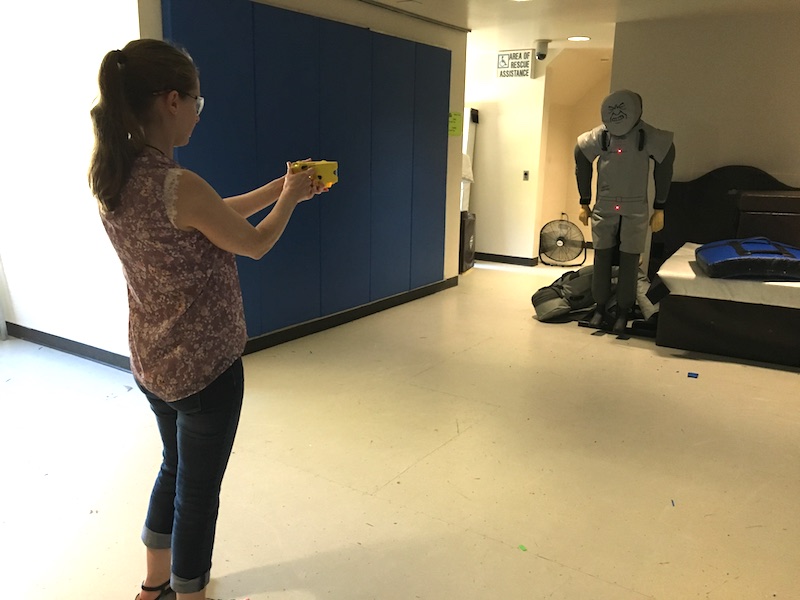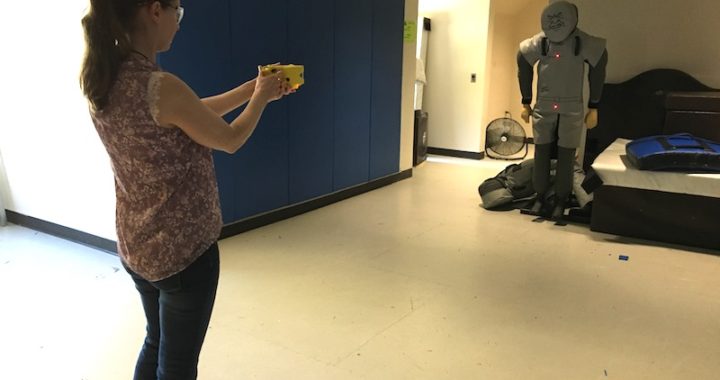Writers’ Police Academy Wrap-Up
What happens when you take the pen out of a writer’s hand and replace it with a pistol (or a Taser or a police baton)? At a public safety school in Wisconsin where real training happens for police trainees, I found out.
The 10th annual Writers’ Police Academy brought writers from across the U.S. and as far away as Australia, Switzerland and Germany, all anxious for the kind of hands-on research that makes their families ask, “should I be concerned?” Conference headliners this year were guest of honor, international bestseller Jeffery Deaver and special guest speaker, forensic artist Carrie Stuart Parks. Instructors included police officers, firefighters, paramedics, and forensic specialists.
A house is on fire. And a body needs to be recovered from the river.
I can see the smoke seeping out of the house. I can smell it, too. That’s when a fire engine and a fire truck pull up, along with EMS. The firefighters gear up fast, using a ladder to reach the second story. A firefighter sticks his head through the window and then he’s gone, into the burning building. He reemerges fifteen seconds later carrying a “person.” Of course, the house is a training building, one that’s often set on fire for firefighters to practice. A group of writers stand nearby, listening to the process the firefighters are following being described to us. Eventually, firefighters who’ve taken the ladder way up to the top of the building to vent it come back down and the ones who entered on the first floor reemerge, trailed by smoke. The fire has been put out, but someone still goes back in to test the air and make sure it’s safe to breathe – and to confirm no fire remains in the walls.

A house is on fire. And a body needs to be recovered from the river…
The next day, we head to the river, for a similar demonstration. This time, it’s divers suiting up, to recover a “body.” Again, they’re surrounded by writers, taking pictures, greedily jotting down every detail in case they want to use it in a book someday.
Shoot? Or don’t shoot?
That’s the question of the hour at one of my “high intensity training (HIT)” classes. I’m standing in front of a large screen, watching a man (who matches the description of a suspect). He’s got his hands shoved into his pockets and he keeps moving them, as if he might be about to pull a weapon. The whole time, I’m analyzing: his posture, his expressions, a shift in his arms that indicates he’s about to make a sudden movement. He might be a threat – to my life or a nearby citizen in this fake neighborhood. If he is, I need to eliminate the threat – and fast, before he shoots me. If not? Well, I don’t want to fire at someone who’s unarmed.
My fellow writers and I faced scenario after scenario like this. None of us shot an unarmed person. But more than one of my classmates was shot themselves because they either didn’t draw or they didn’t fire fast enough when the person did decide to use a weapon. My scenario? After finally pulling his hands from his pockets to show they were empty, the suspect said he was going to provide some ID. He reached into his back pocket and pulled a gun on me. I shot him in the neck (with my simulated weapon).
Police batons and tasers and SWAT guns, oh my!

This is one dummy that persistent!
Immediately after arriving in Wisconsin, I found myself in a hotel ballroom, surrounded by different “stations.” Did I want to put on a police duty belt and shoot “pepper spray” at a suspect? Or maybe put on a Kevlar vest and learn how to strike a “suspect” with a baton? Or perhaps I wanted to handcuff someone – and then take them out of the handcuffs, without letting them use those cuffs as a weapon against me. Yep, I wanted to try it all.
Later, I was back in another HIT session, shooting a taser. I didn’t volunteer to be on the other end of that taser – but one writer and two real police academy recruits did. So, I got to see firsthand what kind of result it had – and what sort of taser shot would immobilize someone briefly versus a shot where the suspect could still pick up a weapon and attack while being tased.
Some of my favorite sessions involved learning how to clear a hallway, a doorway or a staircase – all “fatal funnels” particularly dangerous to an officer trying to enter them. I was able to try on SWAT gear and use a “pellet” gun to run through a building, simulating a multiple active shooter scenario. There was a real SWAT officer beside me, his hand on my shoulder, pushing me forward, urging “go, go, go!” as I found and eliminated all of the “threats” (paper targets).
All in the name of better, more realistic books.
I’ll admit it: I had a great time playing cop for a few days. But the purpose of the Writers’ Police Academy is to teach authors to write more realistic books. This is something I’ve always taken seriously (over the years, I’ve talked to FBI agents, CIA analysts, DEA agents, Secret Service agents, CBP agents, military officers, forensics specialists and much more). But getting the chance to do some of the same training police recruits undertake before becoming officers was a great experience. There’s no doubt that some of what I learned will show up in a future book. And there’s no doubt I’ll go back someday.
You can learn more about the Writers’ Police Academy here: https://www.writerspoliceacademy.com/
About Elizabeth Heiter
Critically acclaimed and award-winning author ELIZABETH HEITER likes her suspense to feature strong heroines, chilling villains, psychological twists, and a little bit of romance. Her research has taken her into the minds of serial killers, through murder investigations, and onto the FBI Academy’s shooting range. Her novels have been published in more than a dozen countries and translated into eight languages; they’ve also been shortlisted for the HOLT Medallion, the Daphne Du Maurier award, the National Readers’ Choice award and the Booksellers’ Best award and won the RT Reviewers’ Choice award. Learn more at www.elizabethheiter.com

